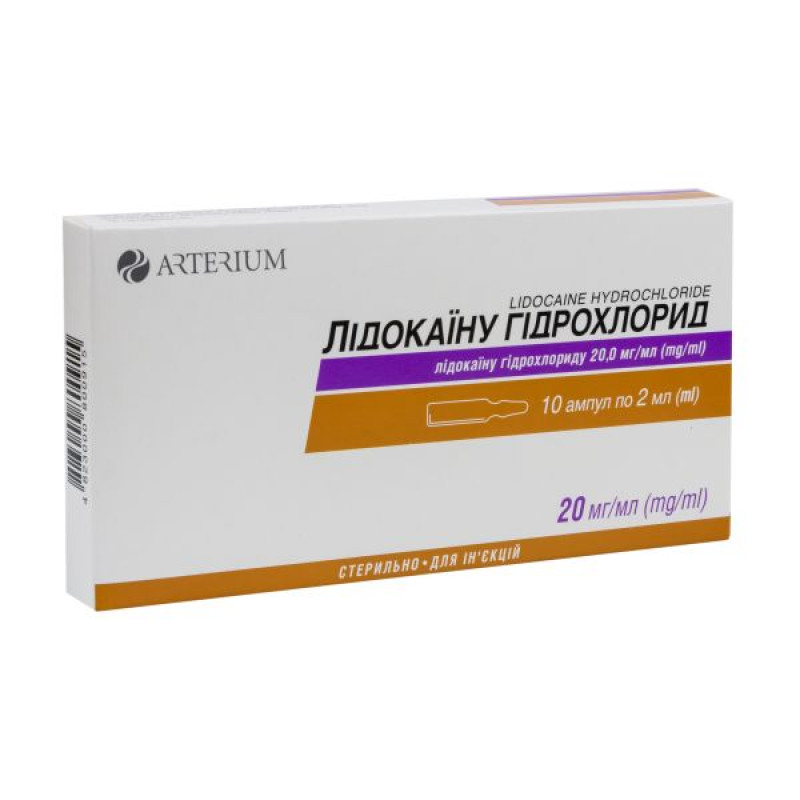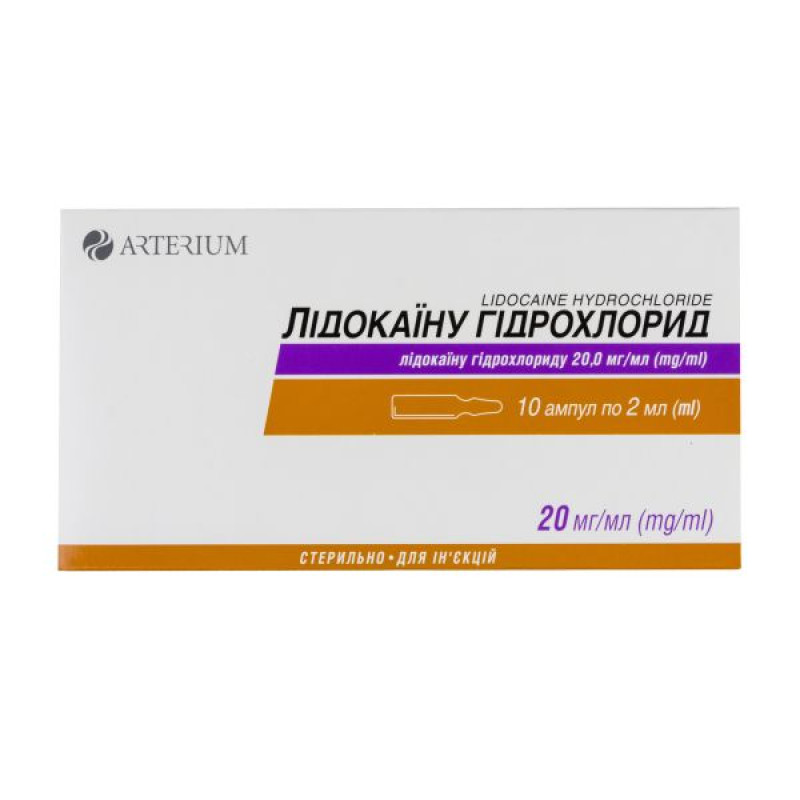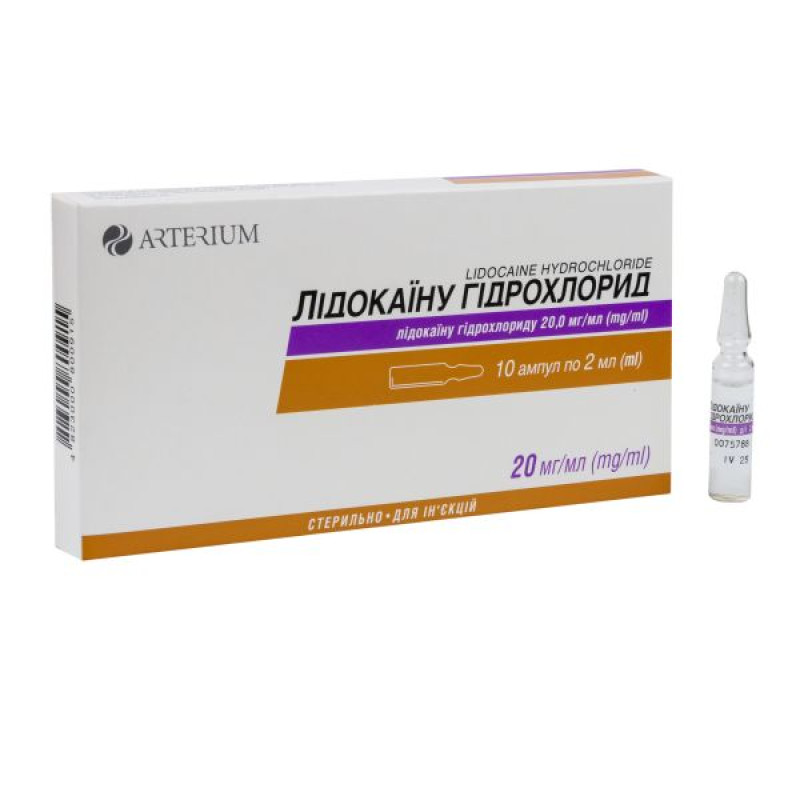Lidocaine hydrochloride solution for injection 2% ampoule 2 ml No. 10

Composition
The main active ingredient in the solution is lidocaine hydrochloride. Auxiliary components: sodium chloride, sodium hydroxide solution, purified water for injection.
Release form
Lidocaine hydrochloride is available as a clear solution without inclusions. Each ampoule contains 2 ml of solution for injection. Ampoules are packed in cardboard boxes of 10 pieces.
Pharmacological properties
Lidocaine hydrochloride belongs to the short-acting local anesthetics. Its action is based on a decrease in the permeability of the neuron membrane to sodium ions. This effectively reduces the rate of depolarization, increases the rate of excitation, and creates numbness of tissues in a certain area.
Lidocaine is used for conduction anesthesia, can be administered in various parts of the body, allows you to control arrhythmia. It is characterized by a rapid effect and onset of action 1 minute after intravenous administration (15 minutes after intramuscular administration). The active substance quickly spreads into the surrounding tissues. The action lasts from 10 to 90 minutes.
Systemic absorption of lidocaine is determined by the site and method of administration, the dosage volume and its pharmacological profile. The maximum concentration is achieved after intercostal blockade, as well as when used in the lumbar region (epidural space). Long-term analgesic effect is maintained with injections into the brachial plexus and subcutaneous tissues.
The main factor that affects the rate of absorption and concentration of Lidocaine in tissues is the dose volume, regardless of the site of administration.
Lidocaine hydrochloride metabolites can penetrate into breast milk and are excreted in the urine within 2 days.
Indication
Lidocaine hydrochloride solution 2% is used for local anesthesia in various areas of medicine:
- ophthalmology;
- dentistry;
- general surgery;
- otolaryngology.
Effective 2% Lidocaine solution is often used for blockade of peripheral nerves and nerve plexuses in patients with sharp and severe pain in neuralgia. The drug is used as an application anesthesia to relieve pain of mucous membranes in gynecology, dentistry, gastroenterology, pulmonology, ENT practice. The drug relieves discomfort and unpleasant sensations during diagnostic procedures and surgical interventions.
Contraindication
Lidocaine hydrochloride 2% is not prescribed in case of allergy to the main active ingredient or auxiliary components. Other contraindications and restrictions include:
- severe pathologies of the cardiovascular system;
- cardiogenic or hypovolemic shock;
- stage of acute decompensation in heart failure;
- severe heavy bleeding;
- arterial hypotension;
- infection at the site of the lumbar puncture.
Lidocaine hydrochloride 2% is prescribed with great caution in the following situations:
- myasthenia gravis;
- epilepsy;
- complete or incomplete intracardiac conduction block;
- severe heart rhythm disturbances, bradycardia;
- respiratory depression;
- blood clotting disorders;
- the patient is over 65 years old;
- the last trimester of pregnancy.
When using "% Lidocaine solution for subarachnoid anesthesia, it is necessary to remember the precautions for the following pathologies:
- any brain infections;
- benign and malignant brain tumors;
- frequent migraine attacks;
- arterial hypertension or hypotension;
- acute psychoses.
Lidocaine is not prescribed for severe liver pathologies.
Application
In each case, the doctor calculates the dosage individually. The volume of the drug Lidocaine depends on the injection site, age, and severity of the patient's condition. The drug should be administered in the lowest concentration and lowest dose that provides an analgesic effect.
The maximum daily and single dose for adult patients should not exceed 300 mg.
In patients over 12 years of age, a single dose of Lidocaine for intravenous or intramuscular administration should not exceed 4.5 mg/kg, with a maximum allowable dose of 300 mg.
Children, the elderly, and weakened patients after surgery or trauma should be given Lidocaine in the minimum acceptable dose appropriate for their age and health status.
Special instructions
When administered into inflamed or infected areas, the analgesic effect of Lidocaine may be reduced.
When used as a conduction anesthesia, it may lead to depression and provoke depression of the cardiovascular system.
Negatively affects the ability to drive vehicles and mechanisms. After administration, it is necessary to refrain from driving a car and performing precise work.
Side effects
Common side effects of Lidocaine include:
- vomiting;
- hives, allergic reactions;
- bronchospasm;
- heart rhythm disturbances;
- dizziness;
- a sharp rise in blood pressure.
Overdose
Symptoms of overdose:
- cramps;
- shock state;
- respiratory depression.
If symptoms of overdose appear, you should consult a doctor and undergo symptomatic treatment.
Interaction
It is not recommended to administer Lidocaine solution simultaneously with the following drugs:
- beta-blockers due to increased toxic properties;
- digitoxin;
- curare-like drugs.
Concomitant administration of Lidocaine with hypnotics or sedatives increases the risk of a depressant effect on the nervous system and brain.
Storage conditions
Lidocaine ampoules should be stored in their original packaging in a dry place protected from light.
You can purchase the drug LIDOCAINE G/X R-R D/IN. 2% 2ML AMP. No. 10 Arterium in any way by placing an order on our website anc.ua. You can choose the most convenient payment and delivery options yourself. Pick up the drug at the pharmacy yourself or use the services of a courier to your home or work.
There are no reviews for this product.
There are no reviews for this product, be the first to leave your review.
No questions about this product, be the first and ask your question.








